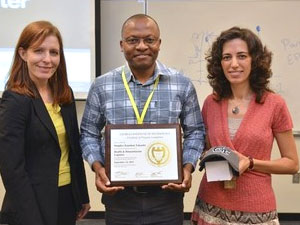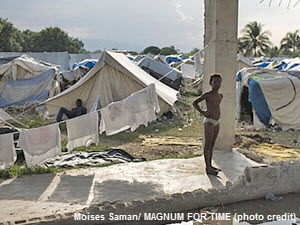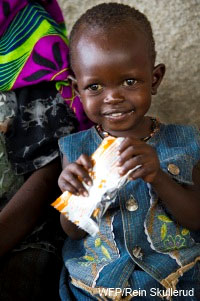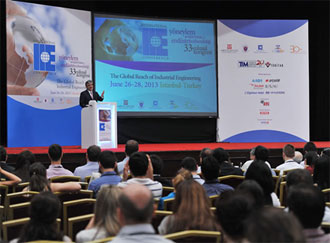In this Issue
|
Join the conversation and help us make this world a better and safer place to live
The Georgia Tech Center for Health & Humanitarian Logistics (HHL) is now on LinkedIn and Facebook providing another way you can join in on the conversation and stay connected. |
2013 Health & Humanitarian Logistics Conference
 The 2013 Health and Humanitarian Logistics Conference held in Kuala Lumpur June 4-5 brought together 113 participants from 25 different countries across the globe to listen and discuss ways to improve operations in the sector under the headline: Adaptive Supply Chains to Increase Resilience. With the goal of stimulating innovation and capacity building to improve supply chains in disaster response and long-term development, leaders from NGOs such as CARE, Catholic Relief Services, Save The Children, the International Federation of the Red Cross/Red Crescent to UN organizations such as UNICEF and the World Food Programme; industry leaders in logistics (such as UPS and Menlo Worldwide) and healthcare (GlaxoSmithKline); researchers from academic institutions and foundations across the globe; and local and international public officials presented information through plenary panels as well as by stimulating discussion in break-out workshops. The conference was co-organized by the Georgia Tech Center for Health & Humanitarian Logistics with the MIT Disaster Response Lab and hosted by the Malaysia Institute of Supply Chain Innovation (MISI). The event was made possible by generous support from the UPS Foundation for the 5th year.
The 2013 Health and Humanitarian Logistics Conference held in Kuala Lumpur June 4-5 brought together 113 participants from 25 different countries across the globe to listen and discuss ways to improve operations in the sector under the headline: Adaptive Supply Chains to Increase Resilience. With the goal of stimulating innovation and capacity building to improve supply chains in disaster response and long-term development, leaders from NGOs such as CARE, Catholic Relief Services, Save The Children, the International Federation of the Red Cross/Red Crescent to UN organizations such as UNICEF and the World Food Programme; industry leaders in logistics (such as UPS and Menlo Worldwide) and healthcare (GlaxoSmithKline); researchers from academic institutions and foundations across the globe; and local and international public officials presented information through plenary panels as well as by stimulating discussion in break-out workshops. The conference was co-organized by the Georgia Tech Center for Health & Humanitarian Logistics with the MIT Disaster Response Lab and hosted by the Malaysia Institute of Supply Chain Innovation (MISI). The event was made possible by generous support from the UPS Foundation for the 5th year. |
Engineering in Public Health Symposium at CDC
 "Engineering and Operations Research in Public Health," the first forum ever to be held at the Centers for Disease Control and Prevention, will address the role of engineering in public health and will be conducted Wednesday, July 31 from 8-5 pm on the Roybal Campus at the CDC Global Communications Center in Atlanta. Speakers include Georgia Tech faculty member Dr. Julie Swann, Co-Director of the Health & Humanitarian Logistics Center and collaborator with the CDC as Senior Science Advisor for the H1N1 response initiative from 2009-2010. Participants will have a unique opportunity to visit the CDC Emergency Operations Center and Bio labs. The Forum will include CDC personnel as well as students and staff from local universities and engineers from local private sector firms. Please see the IIE Society for Health Systems July 2013 Newsletter for more information.
"Engineering and Operations Research in Public Health," the first forum ever to be held at the Centers for Disease Control and Prevention, will address the role of engineering in public health and will be conducted Wednesday, July 31 from 8-5 pm on the Roybal Campus at the CDC Global Communications Center in Atlanta. Speakers include Georgia Tech faculty member Dr. Julie Swann, Co-Director of the Health & Humanitarian Logistics Center and collaborator with the CDC as Senior Science Advisor for the H1N1 response initiative from 2009-2010. Participants will have a unique opportunity to visit the CDC Emergency Operations Center and Bio labs. The Forum will include CDC personnel as well as students and staff from local universities and engineers from local private sector firms. Please see the IIE Society for Health Systems July 2013 Newsletter for more information. |
September Professional Course in Health and Humanitarian Logistics
 We are excited to offer the third course in the Health and Humanitarian Logistics Professional Education series, Systems Operations in Health and Humanitarian Response. The course will be held September 11-13th, 2013 at the Georgia Tech Center for Global Learning. This executive learning program is designed for practitioners in non-governmental organizations, government, and industry who are active participants in humanitarian relief operations, long-term health or development environments and seeking to develop logistics strategies to improve decision making in preparedness, response operations planning, and system design. Courses include many interactive components, such as case studies and games, which help professionals in the humanitarian world to link the challenges and tradeoffs they face in practice with the systematic approaches, tools, and techniques presented.
We are excited to offer the third course in the Health and Humanitarian Logistics Professional Education series, Systems Operations in Health and Humanitarian Response. The course will be held September 11-13th, 2013 at the Georgia Tech Center for Global Learning. This executive learning program is designed for practitioners in non-governmental organizations, government, and industry who are active participants in humanitarian relief operations, long-term health or development environments and seeking to develop logistics strategies to improve decision making in preparedness, response operations planning, and system design. Courses include many interactive components, such as case studies and games, which help professionals in the humanitarian world to link the challenges and tradeoffs they face in practice with the systematic approaches, tools, and techniques presented.
A limited number of scholarships are available through the generosity of The UPS Foundation, Andrea L. Laliberte, and Richard E. and Charlene O. Zalesky, for participants from non-governmental organization and/or from developing countries. |
Coalition for Cholera Prevention and Control
 The Health and Humanitarian Logistics (HHL) Center participated in the second meeting of the Coalition for Cholera Prevention and Control (CCPC) June 3- 4th on the National Institutes of Health Campus in Bethesda, Maryland. Over the past year, HHL Center led the Logistics and Procurement section of the Comprehensive Integrated Strategy for Cholera Prevention and Control. Cholera remains a serious burden that, in some areas, is getting worse. The Bill & Melinda Gates Foundation awarded a grant to form the CCPC to "accelerate development of a comprehensive global strategy to prevent and control cholera, building on recent developments in thinking about the appropriate use of oral cholera vaccines in preventing and controlling epidemic and endemic cholera." In addition to Georgia Tech's HHL Center, the Coalition includes participants from the Taskforce for Global Health, the Centers for Disease Control, Partners in Health, UNICEF, Médecins Sans Frontiéres to name a few organizations.
The Health and Humanitarian Logistics (HHL) Center participated in the second meeting of the Coalition for Cholera Prevention and Control (CCPC) June 3- 4th on the National Institutes of Health Campus in Bethesda, Maryland. Over the past year, HHL Center led the Logistics and Procurement section of the Comprehensive Integrated Strategy for Cholera Prevention and Control. Cholera remains a serious burden that, in some areas, is getting worse. The Bill & Melinda Gates Foundation awarded a grant to form the CCPC to "accelerate development of a comprehensive global strategy to prevent and control cholera, building on recent developments in thinking about the appropriate use of oral cholera vaccines in preventing and controlling epidemic and endemic cholera." In addition to Georgia Tech's HHL Center, the Coalition includes participants from the Taskforce for Global Health, the Centers for Disease Control, Partners in Health, UNICEF, Médecins Sans Frontiéres to name a few organizations.
|
A Decision Support Tool for Managing Stocks and Transportation of Specialized Nutritious Foods
 In order to treat and prevent malnutrition, specialized nutritious foods (SNFs) have been widely recognized and used by feeding programs due to their high nutritional value. However, the difficulty of these foods to withstand high temperatures as well as short shelf life and high unit cost pose significant challenges to managing the supply chain of these commodities. Melih Celik, a PhD student at the Center for Health and Humanitarian Logistics, has been working as part of a group specializing on SNFs at the World Food Programme (WFP) and has taken part in the publication of a guideline on supply chain management of SNFs by carrying out a detailed analysis of historical SNF supply chain data. He has also developed a decision support tool that provides better visibility into the global stocks of SNFs and helps make ordering, stock assignment and corridor selection decisions. When implemented, the tool is expected to decrease shortages and commodity spoilage, while increasing the level of coordination throughout the SNF supply chain.
In order to treat and prevent malnutrition, specialized nutritious foods (SNFs) have been widely recognized and used by feeding programs due to their high nutritional value. However, the difficulty of these foods to withstand high temperatures as well as short shelf life and high unit cost pose significant challenges to managing the supply chain of these commodities. Melih Celik, a PhD student at the Center for Health and Humanitarian Logistics, has been working as part of a group specializing on SNFs at the World Food Programme (WFP) and has taken part in the publication of a guideline on supply chain management of SNFs by carrying out a detailed analysis of historical SNF supply chain data. He has also developed a decision support tool that provides better visibility into the global stocks of SNFs and helps make ordering, stock assignment and corridor selection decisions. When implemented, the tool is expected to decrease shortages and commodity spoilage, while increasing the level of coordination throughout the SNF supply chain.
Melih Celik, an ISyE PhD student, holds MS degrees in Industrial Engineering (from Middle East Technical University, Turkey) and Operations Research (from the Georgia Institute of Technology). He has been working as a research assistant at the Center for Health and Humanitarian Logistics over the last four years and has been involved in a number of projects including distribution of donated blood units in developing countries, management of post-disaster debris, assessment of disaster preparedness in various Caribbean countries, and expansion of the donated breast milk supply chain in South Africa. |
In-Kind Donations: "The Second Disaster"
Today, unsolicited in-kind donations from well-intended donors often cripple relief operations and create what is known as the "second disaster". To address the issue, NGOs have mounted public education campaigns for "cash only" donations. This effort has not been effective in reducing the flow of unsolicited in-kind donations in response to disaster. ISyE Ph.D. Student Moin Islam along with Professor John Vande Vate are working on a "Retail Donation Model" that can help NGOs covert the energy and willingness of well-intended donors, who want to do something specific, to productive in-kind donations. |
IIE International Conference: Istanbul, Turkey
 The Institute of Industrial Engineers (IIE) 2013 Conference, "The Global Reach of Industrial Engineering," took place this year in Istanbul, Turkey June 26-28. The conference brought together researchers and practitioners from a number of countries and disciplines in Industrial Engineering including Operations Research Supply Chain, Quality, Manufacturing and Systems Engineering. HHL Center Co-Director Dr. Pinar Keskinocak participated as a plenary/tutorial speaker and addressed the tremendous importance and potential of academic research in the area of health and humanitarian logistics to impact the damage done by natural and man-made disasters. According to Dr. Keskinocak, given the number of disasters that have swept through various parts of the world in the past decade: "there are long-term issues due to lack of basic necessities, including shelter, water, food, and access to healthcare. Given the complexity of the problems faced and the lives at stake, there is a tremendous need and potential for academic research in this area, and the impact of this research is expected to be significant both in terms of the number of lives that can be saved and the economic value."
The Institute of Industrial Engineers (IIE) 2013 Conference, "The Global Reach of Industrial Engineering," took place this year in Istanbul, Turkey June 26-28. The conference brought together researchers and practitioners from a number of countries and disciplines in Industrial Engineering including Operations Research Supply Chain, Quality, Manufacturing and Systems Engineering. HHL Center Co-Director Dr. Pinar Keskinocak participated as a plenary/tutorial speaker and addressed the tremendous importance and potential of academic research in the area of health and humanitarian logistics to impact the damage done by natural and man-made disasters. According to Dr. Keskinocak, given the number of disasters that have swept through various parts of the world in the past decade: "there are long-term issues due to lack of basic necessities, including shelter, water, food, and access to healthcare. Given the complexity of the problems faced and the lives at stake, there is a tremendous need and potential for academic research in this area, and the impact of this research is expected to be significant both in terms of the number of lives that can be saved and the economic value."
Photo credit: http://www.tccb.gov.tr/news/397/86532/gul-attends-the-international-iie-conference-inauguration-ceremony.html
|
 |
|
|
|
